
Hipposideros is one of the most diverse genera of bats, with more than 70 species. They are collectively called roundleaf bats after the shape of their nasal ornament. It is the type genus of the family Hipposideridae. It is divided into species groups based on morphology.

The Aba roundleaf bat, also known as the Aba leaf-nosed bat is a species of bat in the family Hipposideridae. It is found in West Africa along the southern coast from Nigeria to Senegal. Populations have also been noted in Sudan and Uganda. Its natural habitats are subtropical or tropical moist lowland forests, dry and moist savannas, and caves.

Sundevall's roundleaf bat, also called Sundevall's leaf-nosed bat, is a species of bat in the family Hipposideridae.

The greater roundleaf bat is a species of bat in the family Hipposideridae found in Cameroon, the Democratic Republic of the Congo, and Kenya. Previously placed in Hipposideros, it was transferred to Doryrhina because it is assumed to be closely related to the cyclops roundleaf bat.

The cyclops roundleaf bat or cyclops leaf-nosed bat is a species of bat in the family Hipposideridae found in the forests of equatorial Africa. It is placed in the genus Doryrhina together with the closely related greater roundleaf bat.
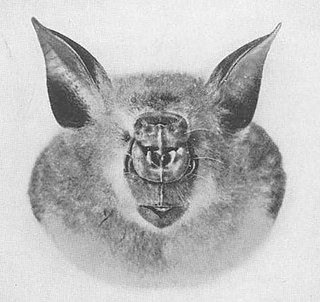
The giant roundleaf bat is a species of bat in the family Hipposideridae found in western tropical Africa. Its natural habitats are subtropical or tropical moist lowland forests and caves. The species was formerly considered part of M. commersoni, which is now viewed as being restricted to Madagascar. Both commersoni and it were formerly placed in the genus Hipposideros, but moved to the resurrected Macronycteris in 2017 on the basis of molecular evidence. It is threatened by habitat loss.

The Kolar leaf-nosed bat, or leafletted leaf-nosed bat is a species of bat in the family Hipposideridae. It is endemic to India. Its natural habitats are subtropical or tropical dry forests and caves. It is found in only one cave in India, and its population is less than 200 individuals.

The Ethiopian large-eared roundleaf bat is a species of bat in the family Hipposideridae. It is found in Djibouti, Eritrea, Ethiopia, Kenya, Saudi Arabia, and Somalia. Its natural habitats are dry savanna, subtropical or tropical dry shrubland, caves, and hot deserts.
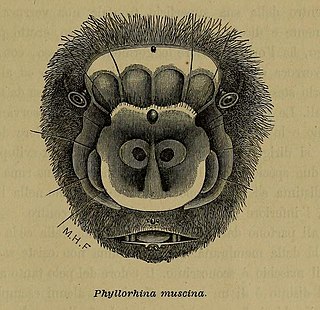
The Fly River roundleaf bat is a species of bat in the family Hipposideridae. It is found in West Papua, Indonesia and Papua New Guinea.
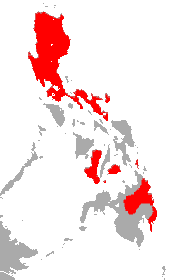
The Philippine forest roundleaf bat is a species of bat in the family Hipposideridae. It is endemic to the Philippines.

The Pomona roundleaf bat, Pomona leaf-nosed bat, or Andersen's leaf-nosed bat is a species of bat in the family Hipposideridae that is endemic to India.

The Sumba roundleaf bat is a species of bat in the family Hipposideridae. It lives in Indonesia and East Timor. It is present on the islands of Sumba, Rote, Sumbawa, Flores, Semau, and Savu.

The São Tomé leaf-nosed bat is a species of bat in the family Hipposideridae. It is endemic to the island of São Tomé, in the Gulf of Guinea off the western coast of Africa. The bat's natural habitats are subtropical or tropical moist lowland forests and caves.
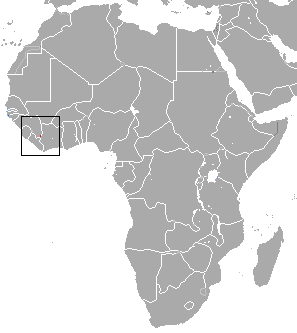
Lamotte's roundleaf bat is a species of bat found only at Mount Nimba on the border of Côte d'Ivoire, Guinea and Liberia. It is critically endangered.
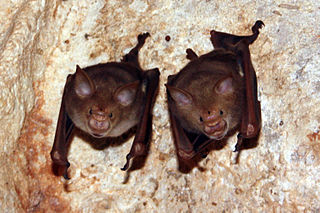
The Hipposideridae are a family of bats commonly known as the Old World leaf-nosed bats. While it has often been seen as a subfamily, Hipposiderinae, of the family Rhinolophidae, it is now more generally classified as its own family. Nevertheless, it is most closely related to Rhinolophidae within the suborder Yinpterochiroptera.
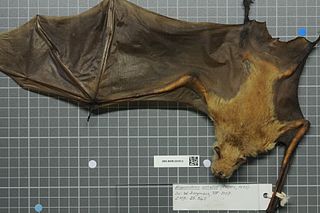
The striped leaf-nosed bat is a species of bat native to eastern and southern Africa. It was formerly considered part of M. commersoni, which is now viewed as being restricted to Madagascar. Both commersoni and it were formerly placed in the genus Hipposideros, but moved to the resurrected Macronycteris in 2017 on the basis of molecular evidence.
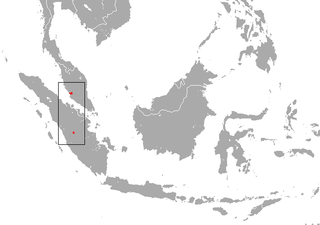
The orbiculus leaf-nosed bat, also known as the orbiculus roundleaf bat and small disc roundleaf bat, is a species of bat from the family Hipposideridae. The species has been found on the island of Sumatra in Indonesia and on peninsular Malaysia.

Commerson's roundleaf bat, also known as Commerson's leaf-nosed bat, is a species of bat endemic to Madagascar. It is named after French naturalist Philibert Commerson (1727-1773). Bat populations of Africa or São Tomé and Príncipe formerly considered part of this species are now classified separately as M. gigas, M. thomensis or M. vattatus, while one from Madagascar was split off to become M. cryptovalorona. It was formerly placed in the genus Hipposideros, but moved to the resurrected Macronycteris in 2017 on the basis of molecular evidence.

The shield-nosed leaf-nosed bat or shield-nosed roundleaf bat is a bat from Laos and Vietnam.
Hipposideros bernardsigei is a hipposiderid species of bat known by fossil specimens, one of the many new taxa of microchiropterans discovered in the Riversleigh World Heritage Area.


















